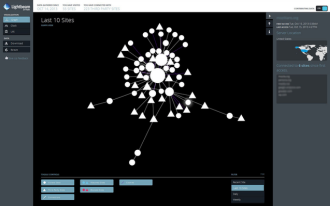|

A couple years
ago, Mozilla published an add-on tool called Collusion for monitoring which
websites were tracking your movements around the Internet. A follow-on app named
Lightbeam,
with even greater power, has been released: "Shining a spotlight on online data
tracking to help people understand the Web around them." As with Collusion,
Lightbeam gives you a picture of all the websites that are notified of your
presence on your targeted website. For instance, when you evaluate
RF Cafe using Lightbeam
(click thumbnail to left), you will discover that Google and DoubleClick (a Google
subsidiary) are notified in order to serve pay-per-click banner advertisements.
I depend on them to generate revenue for putting food on my table and a roof over
my head. To be honest, I have no idea what happens after Google checks in, other
than being fairly confident that the NSA is also notified as they are for every
click, e-mail, or phone call you make anywhere, anytime.
 If you have
noticed how long websites take to load, it is due primarily to waiting for all the
third-party ads to be served, although the quantity and file size of images also
factor heavily. Go to a website (or refresh the one you're on) and watch how long
it takes until the little spinning thingy at the top to finally stops spinning to
see how much time the page really takes to completely load. RF Cafe is typically
much faster than the majority of engineering websites because I minimize the use
of third-party ads, and then reject ones with videos since they are the worst offenders.
If I see a stupid Google Ad appear on RF Cafe, I use my account settings to block
the company's ads. A lot get through anyway since new companies appear all the time,
but at least I make an effort at keeping you from suffering online dating and political
type ads, among others. BTW, those are usually the highest paying ad types, so I
willingly sacrifice that revenue to spare you the annoyance. If you have
noticed how long websites take to load, it is due primarily to waiting for all the
third-party ads to be served, although the quantity and file size of images also
factor heavily. Go to a website (or refresh the one you're on) and watch how long
it takes until the little spinning thingy at the top to finally stops spinning to
see how much time the page really takes to completely load. RF Cafe is typically
much faster than the majority of engineering websites because I minimize the use
of third-party ads, and then reject ones with videos since they are the worst offenders.
If I see a stupid Google Ad appear on RF Cafe, I use my account settings to block
the company's ads. A lot get through anyway since new companies appear all the time,
but at least I make an effort at keeping you from suffering online dating and political
type ads, among others. BTW, those are usually the highest paying ad types, so I
willingly sacrifice that revenue to spare you the annoyance.
 Mozilla claims
there is a lot of analytical power available in
Lightbeam, so if you are really interested in digging into the Internet's dark,
spooky corners, this might be the place to start - just be careful what you uncover
or you risk being visited in the middle of the night by government Ninjas in full
battle gear. Three types of data displays are provided by Lightbeam. 1) Graph view
draws a picture of the 3rd-party connections emanating from the primary website.
2) Clock view tracks your connections over time. 3) List view gives you the gory
details of your connections - both intended and unintended. Mozilla claims
there is a lot of analytical power available in
Lightbeam, so if you are really interested in digging into the Internet's dark,
spooky corners, this might be the place to start - just be careful what you uncover
or you risk being visited in the middle of the night by government Ninjas in full
battle gear. Three types of data displays are provided by Lightbeam. 1) Graph view
draws a picture of the 3rd-party connections emanating from the primary website.
2) Clock view tracks your connections over time. 3) List view gives you the gory
details of your connections - both intended and unintended.
Below are screen captures of a lot of the websites I visit every day to collect
worthwhile technical headlines. In most cases, the length of time it takes a web
page to load is nearly proportional to how many connections you see. Note that the
IEEE USA website has no 3rd-party connections since it has no advertisements other
than its own. Accordingly IEEEUSA.org
loads very quickly. On the other hand, CNN Tech and
Fox News Science
pages take a much longer time to completely load. If any page happens to host an
ad with video in it, expect to wait even longer. As stated in the past, I make an
attempt to not post links to any web page that starts playing a video of any sort
without your permission. To get a useful metric of web page loading times, try the
Pingdom Website Speed Test
utility (free).
 Space Daily |
 Semiconductor Today |
 Science Daily |
 RF Cafe |
 NPR Tech News |
 NFC World |
 New York Times Tech News |
 Military Aerospace Electronics |
 IEEE USA |
 Fox News Tech News |
 EE Times |
 EDN |
 Drudge Report |
 Daily KOS |
 CNN Tech News |
 Cellular News |
| |
 BBC Tech News |
|
|
Posted October 27, 2013
|





 "
"




















